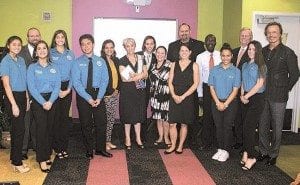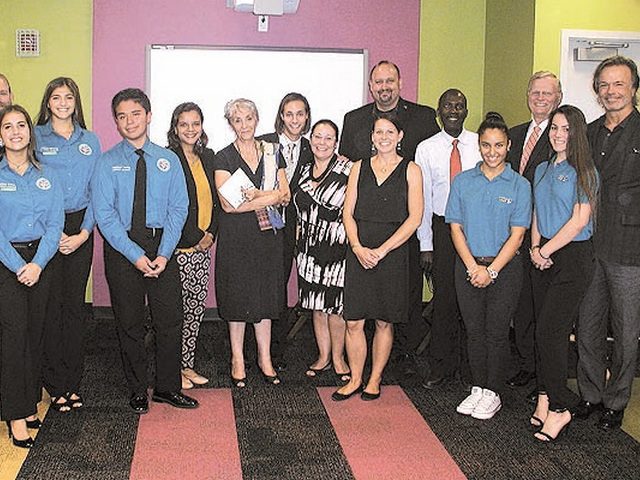
The UM School of Architecture hosted a “Sustainable and Resilient Practices for South Florida” symposium at Cutler Bay Senior High on Thursday, Nov. 19. About 200 students, virtually the entire school’s COAST program, grades 9 through 12, attended.
During the one-and-a-half-hour session, speakers included Sonia Chao of the UM School of Architecture who spoke about Resilient Neighborhoods; Katherine Hagemann, Office of Sustainability, Miami- Dade County, whose topic was Sustainable Communities; Beatriz Baldan of 3-C Innovate, and John Onyango, PhD, UM School of Architecture, gave presentations on Net-Zero Housing Design, and Rodolphe el-Khoury, PhD, dean, UM School of Architecture, conducted a question and answer session.
The purpose of the symposium was to increase awareness among high school students and the community at large about the challenges South Florida is fac- ing due to climate change and sea level rise, how to adapt and ways to reduce residential energy consumption.
“Greenhouse gases, we know that those are coming from our cities,” Chao began. “What we have already emitted is contained in our oceans and waterways, and we can’t undo that quickly. We’re going to have more storms, more frequently, bigger storms and the sea levels are rising. More flooding is possible.”
Chao said that architecture has created some of the problems, with cities that make us dependent on cars, which in turn create more air pollution. She showed map projections of how Florida’s coastal areas likely will be underwater mere decades from now if nothing is done to slow the damage.
The other speakers presented ways of reducing power consumption and water waste by modifying existing homes and using better designs for new ones. They said that businesses too need to adapt.
Marshall Ruffo, the COAST lead teacher for Cutler Bay High helped set up the school’s participation in the symposium, as did Dr. Justin A. Koren, lead teacher of Academic Programs.
“Cutler Bay Senior High School was excited to host this year’s Sustainable and Resilient Practices for South Florida Symposium, presented by the University of Miami Center for Urban and Community Design,” Koren said. “Our students, especially those enrolled in advanced environmental management courses, are eager to learn about best practices relating to residential energy consumption reduction.
“This symposium hopefully inspired our students to think about and, more importantly, come up with real solutions that will positively impact the future of our South Florida community.”
Former Cutler Bay Mayor Ed MacDougall attended and was credited by Dr. Koren with helping the UM symposium and school partnership come about.
“What’s most important is what it means to the children and the future of the country,” MacDougall said. “I don’t mean to be overly philosophical about it but it needs to start with this generation. Our generation needs to give the tools to this new young generation that they will need to change the future. That’s why we started this school; that’s why I’ve tried to help them along as much as I can. It’s about our future, our children and our grandchildren.”
The students were attentive during the presentations and seemed to be impressed by the seriousness of the situation.
“I found it to be very interesting,” said Alanna Alfonso, a sophomore. “It really showed me that we need to change our habits if we want to preserve our ecosystem. I feel fortunate that our school was picked for this symposium.”
Faith Fusillo, a senior added, “It was very informative and opened my eyes about environmental issues that aren’t reported enough and need to be addressed in order to solve global environmental concerns.”
Sonia Chao closed her presentation by urging the students to take seven steps to improve our chances for the future:
1. Educate yourself;
2. Use your vote to make needed changes happen;
3. Adaptation;
4. Promote change at home, school, and in your neighborhood;
5. Curb consumption;
6. Be global: act local, and
7. Plant a tree.
Then she added an important eighth step: “Spread the word.”






